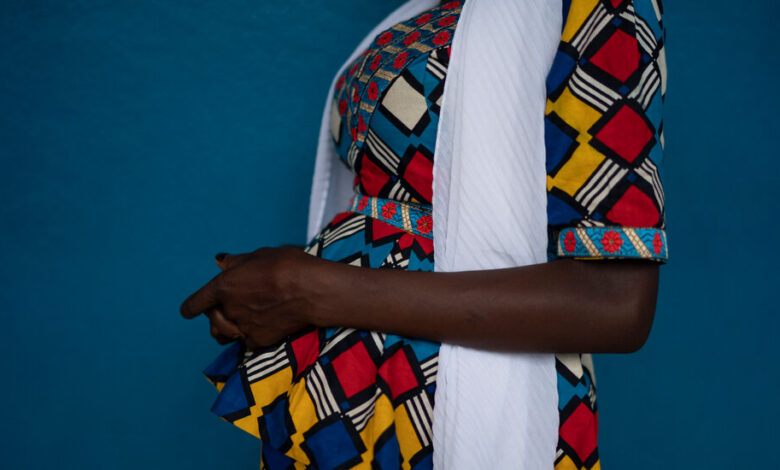Sierra Leone Bans Child Marriage With New Law

The president of the tiny West African nation of Sierra Leone signed a law Tuesday that bans marriages of children under 18 and will impose heavy fines on adult spouses, a victory for activists who have long fought to eradicate the widespread practice.
Experts say the new law goes further than many similar laws in Africa, punishing those who permitted the marriage – such as parents, officiators and even wedding guests – in addition to the husband.
There are an estimated 800,000 girls under the age of 18 married in Sierra Leone, UNICEF reported in 2020, accounting for about one-third of girls in the country. Half were married by age 15. According to Human Rights Watch, about 4 percent of boys were married by age 18.
Under the new law, people who married as children can claim financial compensation. They also have a way out of their marriage: filing for an annulment.
Betty Kabari, a researcher at Human Rights Watch who focuses on women’s rights and sexual health in Africa, praised the approach of punishing those who facilitate the marriages, saying: “For me, the most powerful aspect is to note that children do not marry out of thin air.”
How common is child marriage?
Every year, at least 12 million girls under the age of 18 are married, according to the United Nations. More than 650 million girls and women are married as children.
South Asia has the largest number of child brides, about 290 million, or 45 percent of the global total. Sub-Saharan Africa follow with about 127 million people, accounting for 20 percent.
According to one child marriage map According to Girls Not Brides, a global organization working to end the practice, 16 of the 20 countries with the highest rates are in Africa.
A report published this year by Equality Now A look at 20 countries in Africa found that only a handful have enacted outright bans — and many do not fully enforce them.
What problems can getting married too young cause?
Young marriage often results in girls dropping out of school. Childhood pregnancy can cause long-term damage and trauma.
Sierra Leone is one of the the most dangerous places to have children, this is even more dangerous for teenagers.
“They are forced to become adults before they are actually adults,” said Kadijatu Barrie, 26, a student and program coordinator for Strong Girls Evolution, a networking organization for Sierra Leonean women, among other groups.
Ms Barrie said her family began pressuring her to get married when she was 10, and she was disowned by her father when she refused at 15. She said she worried she would have to drop out of school.
“We have fewer educated women because of all this,” she said.
Many face additional complications from another common cultural practice in the country: female genital mutilation, which is considered a human rights violation. by World Health Organization. About 61 percent Girls in Sierra Leone between the ages of 15 and 19 undergo female genital mutilation, which can cause serious difficulties during childbirth.
How does the ban in Sierra Leone work?
Under a new law that took effect on Tuesday, people who marry children could face up to 15 years in prison or a fine of more than $5,000. That’s a harsh penalty in a country where per capita gross domestic product is expected to grow by about $433 by 2023, according to World Bank data.
This law does not only apply to marriage. It also prohibits cohabitation between adults and sexual relations with children.
Parents are also not allowed to consent to their children’s marriages. Officiants are not allowed to officiate at the wedding. Guests are not allowed to attend the ceremony. In fact, anyone who “aids or abets” the marriage can face up to 10 years in prison or a fine of about $2,500, or both.
The ban fits into a broader initiative in Sierra Leone to promote girls’ rights by keeping them in school and protecting them from genital mutilation.
President Julius Maada Bio launched 22 percent of the national budget education and bringing more women into government. He and his wife, Fatima Bio, have pushed for a ban on child marriage.
“I have always believed that the future of Sierra Leone is women,” Mr. Bio posted. on social media after signing the law with his young daughter by his side.
“We want Sierra Leone to be a leader on the continent and to influence other countries,” said Nerida Nthamburi, head of engagement in Africa for Girls Not Brides.
What are the drawbacks of the ban?
In other countries, criminalizing child marriage has driven the practice underground, bringing communities closer together and leaving girls less protected from the practice, Ms. Nthamburi said.
Researchers and experts say that for the law to have a real impact, Sierra Leone officials will have to build strong relationships with communities, especially in rural areas where child marriage is more common.
That means tackling poverty, which can lead families to marry off their daughters at a young age. It also means expanding efforts to educate communities about sexual and reproductive health.
Many women and girls still have to fight against neighbors, husbands and families to reject marriages, file for annulments or seek compensation.
Ms Barrie was ostracised for refusing family pressure. “They all banded together against me,” she said. “I became the worst person to them.”
She said she tried to stop her sister from getting married at 14. But she heard how Ms Barrie was criticized in the community. Her sister, who had a talent for drawing, wanted to be a fashion designer.
“I couldn’t save her,” Ms. Barrie said. “That still makes me cry.”
Joseph Johnson Contribute report.




